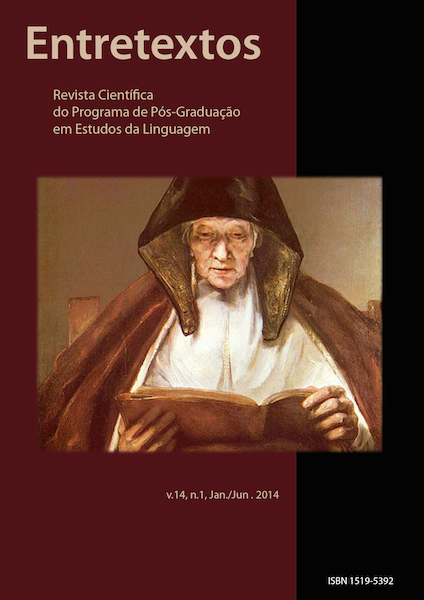Didactic transposition in the Portuguese teachers initial formation process: the place of disciplinary knowledge
DOI:
https://doi.org/10.5433/1519-5392.2014v14n1p172Keywords:
Teachers initial formation, Disciplinary knowledge, Didactic transpositionAbstract
This research deals with contexts of Portuguese teachers initial formation, in events involving didactic transposition of disciplinary knowledge regarding the teaching of this language, particularly grammar knowledge. Situations of interaction between the teacher (tutor) and her students-teachers will be presented. These situations refer to moments of a discipline called Estágio Curricular Supervisionado III (Supervised Curricular Internship III) of a Language Course, offered by a public university in the state of Paraná, Brazil. The situations mentioned above are registered by the teacher in a reflective diary and they involve microteaching activities, lesson plans elaboration, classes run by the students-teachers during their internship and reflective discussions between them and the tutor after those classes. By analyzing the data, based on DOLZ, NOVERRAZ, SCHNEUWLY (2004), CHEVALLARD (2005), SAVIANI (1991), SHULMAN (1986, 1987), TARDIF (2002), among others, the authors ascertained that the students-teachers demonstrate flawed concepts regarding Portuguese basic grammar contents and in some cases they do not even know some of the contents. This caused the tutor to feel distressed for being afraid that her studentsteachers may end up teaching the contents in a wrong way. This feeling of distress was also detected in the students. They demonstrated to be insecure when planning and running their classes without the knowledge required. This juncture evidences problems related to the initial formation of Portuguese teachers. Such problems will consequently bring those professionals difficulties in doing their job. Given the above, this research defends revising the place where disciplinary knowledge should be in the formation of Portuguese teachers. Obviously, this knowledge is not enough to define the identity of this professional. However it is essential for the accomplishment of good quality teaching. KEYWORDS: teac
Downloads
References
DOLZ, J.; NOVERRAZ, M.; SCHNEUWLY, B. Seqüências didáticas para o oral e escrita: apresentação de um procedimento. In: SCHNEUWLY, B.; DOLZ, J. (org.). Gêneros orais e escritos na escola. Campinas: Mercado de Letras, 2004.
GERALDI, J. W. Portos de passagem. 4 ed. São Paulo: Martins Fontes, 1997.
MAZZEU, F. J. C. Uma proposta metodológica para a formação continuada de professores na perspectiva histórico-social. Cadernos CEDES, Campinas, v. 19, n. 44, Apr. 1998.
NÓVOA, A. (org.). Os professores e a sua formação. Lisboa: Publicações Dom Quixote, 1992.
NÓVOA, A. Diz-me como ensinas, dir-te-ei quem és. In: FAZENDA, I. (org.) A pesquisa em educação e as transformações do conhecimento. 12 ed. Campinas: Papirus, 2012. p. 29-41.
PENIN, S. T. S. O ensino como "acontecimento". Cadernos de Pesquisa, São Paulo, n. 98, p. 14-23, 1996.
SAVIANI, D. Pedagogia histórico-crítica: primeiras aproximações. 2 ed. São Paulo: Cortez, 1991.
SHULMAN, L. S. Those Who Understand: Knowledge Growth in Teaching. Educational Researcher, v. 15, n 2, p. 4-14, Feb. 1986.
SHULMAN, L. S. Knowledge and teaching: foundations of the New Reform. Harvard Educational Review, v. 57, n 1, p. 1-22, Feb. 1987.
TARDIF, M. Saberes docentes e formação profissional. Petrópolis: Vozes, 2002.
Downloads
Published
How to Cite
Issue
Section
License
Copyright (c) 2014 Entretextos

This work is licensed under a Creative Commons Attribution 4.0 International License.
Entretextos adota a Licença Creative Commons Attribution 4.0 International, portanto, os direitos autorais relativos aos artigos publicados são do/s autor/es.
Sob essa licença é possível: Compartilhar - copiar e redistribuir o material em qualquer suporte ou formato. Adaptar - remixar, transformar, e criar a partir do material, atribuindo o devido crédito e prover um link para a licença e indicar se mudanças foram feitas.























